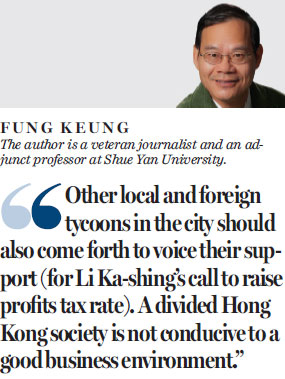Poverty alleviation could be better achieved by reforming tax system
Updated: 2016-07-06 07:26
By Fung Keung(HK Edition)
|
|||||||||
Li Ka-shing, Hong Kong's richest man, has called for a higher profits tax rate for companies to narrow the city's wealth gap. Bravo! Other local and foreign tycoons in the city should also come forth to voice their support.
A divided Hong Kong society is not conducive to a good business environment. The "Occupy Central" political movement in 2014 and the riots in the city's Mong Kok district earlier this year have long-term effects on the local economy. For instance, the number of mainland students coming to study postgraduate courses that start this September is expected to drop at least 30 percent.
Li suggested that the profits tax rate, currently 16.5 percent, can be increased by one or two percentage points. Even if the rate is upped by 3.5 percentage points to reach 20 percent, it will still be just half of the 40-percent rate for companies operating in the United States.
Indeed, the number of poor people in Hong Kong is far higher than the official figure estimated by the government. The government's poverty line is drawn at half the median household income and in 2014 about 960,000 people in the city were classified as living under the poverty line.

The Chinese University of Hong Kong's (CUHK) Social Work Department and the Hong Kong Council of Social Service did a survey in 2014 on the city's poverty situation. The results were released in mid-June 2016. The study revealed that about 14.5 percent of Hong Kong people were deprived. People were deprived, or poor, if they could not afford essential items such as seeing a private doctor.
Only one-third of this 14.5-percent segment was categorized by the government as living below the poverty line. In other words, the remainder could well be deprived, or poor, using yardsticks other than family income. Perhaps using family income to define poverty may not be comprehensive enough. Other measurements should also be considered.
It is hoped that local property bigwigs other than Li can come out to voice their support for Li's recommendation that the profits tax rate for local and foreign companies in Hong Kong should be boosted by a few percentage points. Senior executives of British hongs such as Swire Pacific and HSBC Holdings should also voice their support since British companies have benefited from Hong Kong people's hard labor for more than a century.
Li, meanwhile, rejected the idea of levying higher income taxes for the rich living in the city. It is hoped that Li can change his mind. Rich and poor in Hong Kong are now paying a 15-percent standard income tax. Indeed, the income tax rate could instead become progressive, depending on the amount of income. Many senior executives in Hong Kong make millions of dollars a year.
The richest employee in Hong Kong, Canning Fok Kin-ning, co-managing director of CK Hutchison, pocketed more than HK$213 million last year. CK Hutchison is owned by Li Ka-shing. According to the company's 2015 annual report, the 64-year-old Fok received bonus payments of HK$202.51 million (a 20-percent increase from 2014), while basic salary and welfare remuneration stood at HK$11.1 million, taking his grand total to HK$213.61 million.
Just like many Hong Kong taxpayers, Fok pays a standard 15-percent income tax. Even if the tax rate is increased to 20 percent for Fok - and those like him - he can still take home a mind-boggling HK$171 million. Higher (i.e. progressive) tax rates for rich employees such as Fok can translate into more welfare benefits for the poor and elderly in Hong Kong. The CUHK Social Work Department survey shows that the most deprived group in society is single elderly people, with about 40 percent of them suffering deprivation.
Wealthy company owners and senior executives: Please have a heart and make the underprivileged in Hong Kong have a better life and smile more!
(HK Edition 07/06/2016 page1)